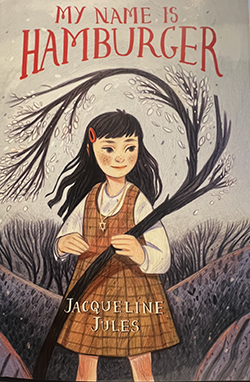My Name Is Hamburger by Jacqueline Jules; Minneapolis, Minnesota: Kar-Ben Publishing (c) 2022; ISBN 9781728-429489; 230 pages; $17.99.

 SAN DIEGO – Told in free verse, this novel for children 8-13 follows a girl who is the only Jew in her school during the early 1960s. Trudie Hamburger is teased by a neighbor boy about her last name, calling her “chopped meat.” He also makes fun of the German accent of her father, who was the only member of his family to escape from the Nazis.
SAN DIEGO – Told in free verse, this novel for children 8-13 follows a girl who is the only Jew in her school during the early 1960s. Trudie Hamburger is teased by a neighbor boy about her last name, calling her “chopped meat.” He also makes fun of the German accent of her father, who was the only member of his family to escape from the Nazis.
Adding to Trudie’s misery is that she believes her best friend and neighbor may prefer to be friends with another girl whose parents belong to a country club where Jews are not accepted as members.
Trudie is very smart, placing second in a spelling bee that is won by a student who is grades ahead of her. But even that had its drawbacks, as it reinforced a stereotype that Jews are all smart.
Matters begin to turn around when a boy from a Korean family moves into the neighborhood and is teased about the shape of his eyes by the same bully. Being outsiders brings Jae-yong and Trudie together, even at the risk of being accused of being boyfriend and girlfriend – embarrassing for elementary school students.
Trudie realizes that Jae-yong can be identified wherever he goes as an Asian, whereas not everyone knows that she is Jewish. Inspired by Jae-Yong, she decides that she should be openly Jewish, as she loves going to synagogue, and observing Shabbat and other holidays at home. Instead of keeping her Magen David pendant under her blouse, she begins to wear it outside.
When her father falls from a roof rescuing Trudie’s toddler brother, community members express a great deal of sympathy for her family and show them many little kindnesses. The girl whom Trudie thought was too snobbish to invite her to a party, in fact does invite her.
In a separate development, the school yard bully gets his comeuppance.
So, while not everything is perfect in Trudie’s life, matters are more positive than she had originally believed.
Besides teaching children to be proud of who they are, and to celebrate their heritage, this novel also suggests that students ought not to assume that others don’t like them. Bullies do not typify societies; they are the often-miserable exceptions.
*
Donald H. Harrison is editor emeritus of San Diego Jewish World. He may be contacted via donald.harrison@sdjewishworld.com